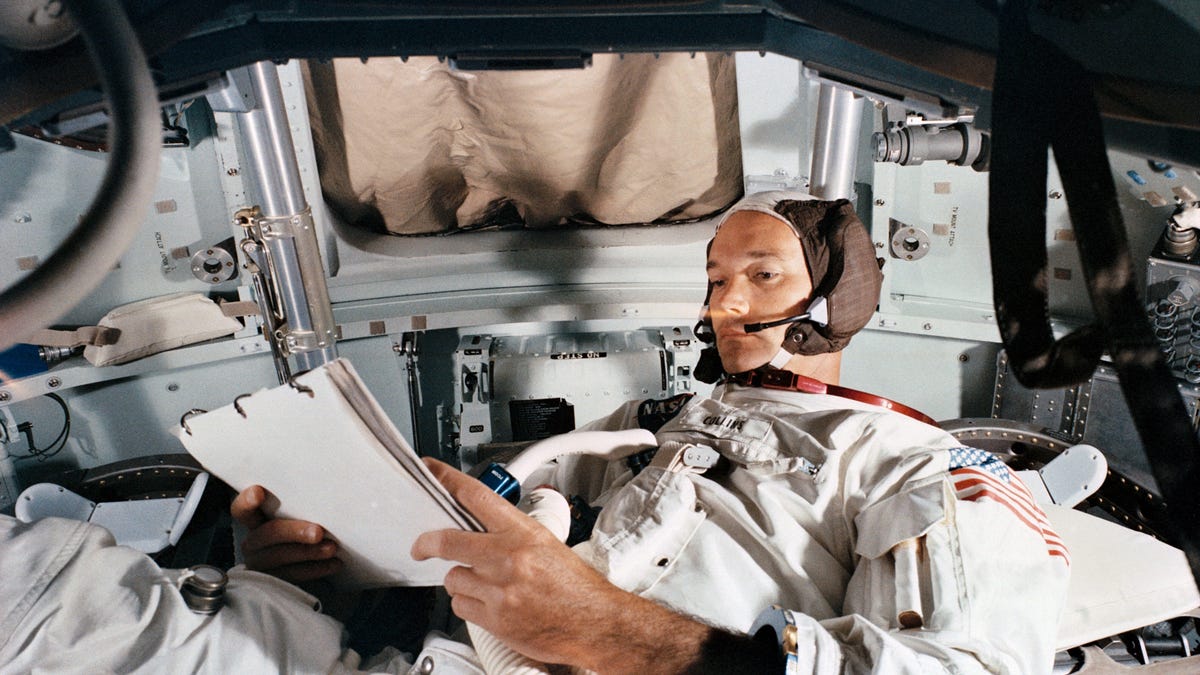Apollo 11 astronaut Michael Collins dies at 90
Collins flew the Apollo 11 command module while Neil Armstrong and Buzz Aldrin walked on the moon.

On June 19, 1969, one month before the moon landing, Michael Collins gets in some training in the command module simulator at the Kennedy Space Center.
Astronaut Michael Collins, who flew with Neil Armstrong and Buzz Aldrin on the Apollo 11 mission that made the first moon landing, has died at the age of 90.
Collins' family shared the news in a statement posted to his official Twitter account on Wednesday.
"We regret to share that our beloved father and grandfather passed away today, after a valiant battle with cancer," the statement said, also asking he be remembered fondly for his "his sharp wit, his quiet sense of purpose, and his wise perspective, gained both from looking back at Earth from the vantage point of space and gazing across calm waters from the deck of his fishing boat."
Family Statement on Passing of Astronaut Michael Collins pic.twitter.com/6OAw7CzFaz
— Michael Collins (@AstroMCollins) April 28, 2021
In a statement, NASA Administrator Steve Jurczyk said, "NASA mourns the loss of this accomplished pilot and astronaut, a friend of all who seek to push the envelope of human potential. Whether his work was behind the scenes or on full view, his legacy will always be as one of the leaders who took America's first steps into the cosmos. And his spirit will go with us as we venture toward farther horizons."
An Air Force pilot, Collins entered the budding space industry in 1963 when he was selected for NASA's Gemini program. He was the pilot for the Gemini 10 mission in 1966.
In July 1969, Collins circled the moon in the Apollo 11 command module as Armstrong and Aldrin landed on the lunar surface. Following those two space flights, during which he logged 266 hours in space, he left NASA in 1970, according to NASA's biography of Collins, and went on to join the State Department, and later to become the director of the National Air and Space Museum for the Smithsonian Institution, among other positions.
In a tweet Wednesday, Aldrin addressed Collins directly: "Wherever you have been or will be, you will always have the Fire to Carry us deftly to new heights and to the future."
Dear Mike,
— Dr. Buzz Aldrin (@TheRealBuzz) April 28, 2021
Wherever you have been or will be, you will always have the Fire to Carry us deftly to new heights and to the future. We will miss you. May you Rest In Peace. #Apollo11 pic.twitter.com/q4sJjFdvf8
Armstrong died in 2012.
Jurczyk noted that Collins was sometimes called the "loneliest man in history," not only having been left by himself in the Apollo 11 command module, but for drifting around the dark side of the moon, where he was temporarily out of contact with NASA during the mission.
Collins also published several books, including his 1974 memoir Carrying the Fire. In it he wrote, "I have dangled from a cord a hundred miles up; I have seen the earth eclipsed by the moon; and enjoyed it."

